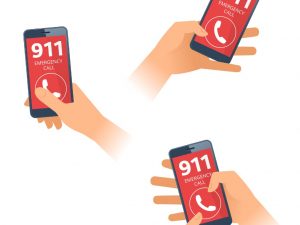The Federal Communications Commission (FCC) has taken action to create a mandate for all VoIP services to follow. It’s known as the E911 mandate which means VoIP providers must include Enhanced 911 emergency calling features in their services.
It’s important for the Enhanced 911 calling features to be made as a part of the standard package to ensure that everyone is able to use it. The reason as to why the E911 mandate has been put into practice is to make sure that people using VoIP services to dial emergency 911 numbers are able to connect consistently.
Overall, it’s a great way to help users of VoIP services have a more reliable way of connecting with 911 operators. However, it also comes with a range of challenges for VoIP service providers. Below, you can learn more about E911 and how it affects VoIP.
All About VoIP and 911 Services
What’s the Difference Between 911 and E911?
There are some huge differences between the standard 911 and E911 services. The regular 911 services involve being able to make calls to emergency services without your address information being passed on to the PSAP (Public Safety Answering Point) or other emergency centers.
Therefore, people making the call to 911 operators must give their address. Previously, this would be problematic in certain situations where the person calling may not have been coherent enough to provide their address information.
In addition to this, when the 911 calls are transferred to PSAP, they’re not provided with any kind of priority.
When using E911 and making a call to emergency services, your address has already been saved in a database. This is known as ALI (Automatic Location Identification). The call is then automatically transferred to a network that has been specifically made for E911 calls.
Therefore, they’re more reliable and can provide the right PSAP emergency service to make sure you get the help you need. The address information is also available on the screen of dispatchers so that they can send the correct emergency service out.
911 & VoIP Services
When VoIP providers started offering their services to businesses, not all of them were able to include E911 services. This was due to a number of technical issues or limitations from businesses.
There was also a larger problem where VoIP providers wouldn’t route 911 calls if businesses hadn’t activated the 911 service themselves.
Many businesses overlooked the issues with 911 calling due to how much money they were saving and how much better they were able to communicate with VoIP services.
The FCC’s actions for making E911 a mandatory part of VoIP services include a range of requirements. For one, VoIP providers must route all 911 calls to the emergency operator that’s nearest to the customer’s location. This feature must also be part of the standard service and not an add-on.
Location details and a call back number must be provided to the emergency operators by VoIP services. Customers have to give the VoIP services their address and the VoIP provider is then required to give this information to the PSAP.
To make sure that all VoIP customers know that they’re able to use these services, VoIP providers must let all customers know of the 911 calling features that are available. This is the case when it comes to existing and new customers.
Some VoIP providers were already providing customers with proper 911 calling abilities. However, the E911 mandate means that all VoIP providers are required to stick by specific guidelines.
For the VoIP providers that included 911 calling as part of their standard service, there won’t be too much for them to change. However, VoIP providers that either didn’t include 911 calling as a mandatory service or didn’t make customers aware that they had to activate it, will have to make more changes.
These VoIP providers must stick to the E911 mandates while also trying to keep their costs in check. They have to also make sure to continue providing their customers with VoIP services while implementing new features.
Conclusion
FCC passing the E911 mandate wasn’t necessarily pointed directly at VoIP providers, as it was commonly thought at the time of the guidelines being passed. Instead, the FCC was fixing a problem among some VoIP services and the reliability of their 911 calling capabilities.
It may be a challenge for some VoIP services to implement these new changes, to begin with.
Ultimately, it’s a good thing for VoIP services in the long run as they’re able to provide their customers with a more reliable way of connecting with the correct emergency operators and receive the help they need.
It’s a feature that will help towards enabling VoIP services to become more mainstream as skeptics will come to trust their services more due to stricter regulations being put in place. Enforcing E911 calling also helps potential customers have even more confidence in using VoIP services.

